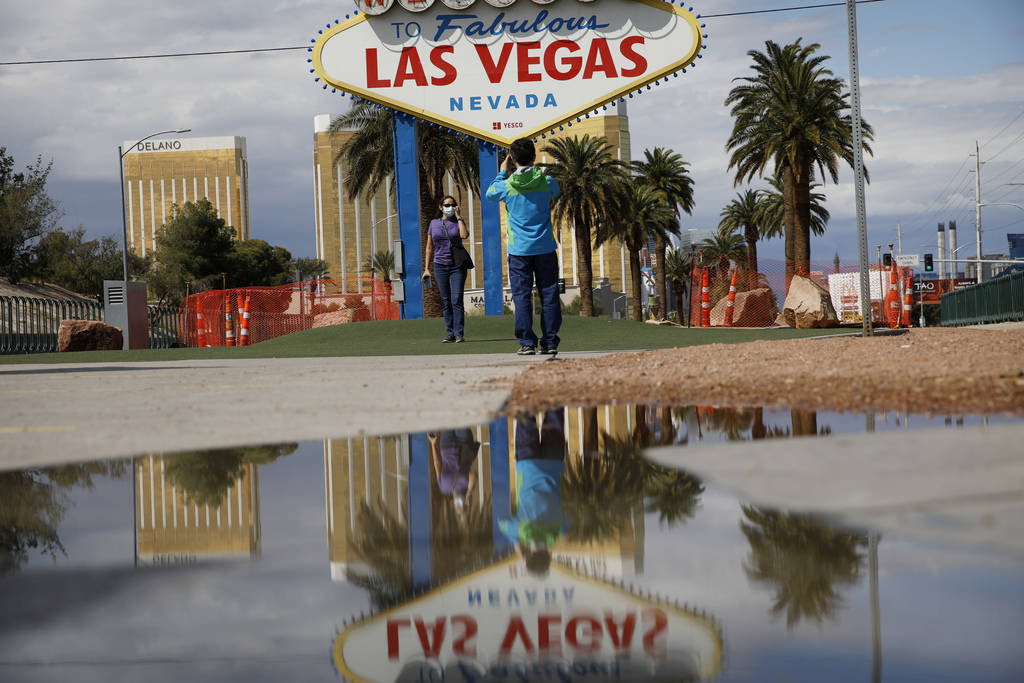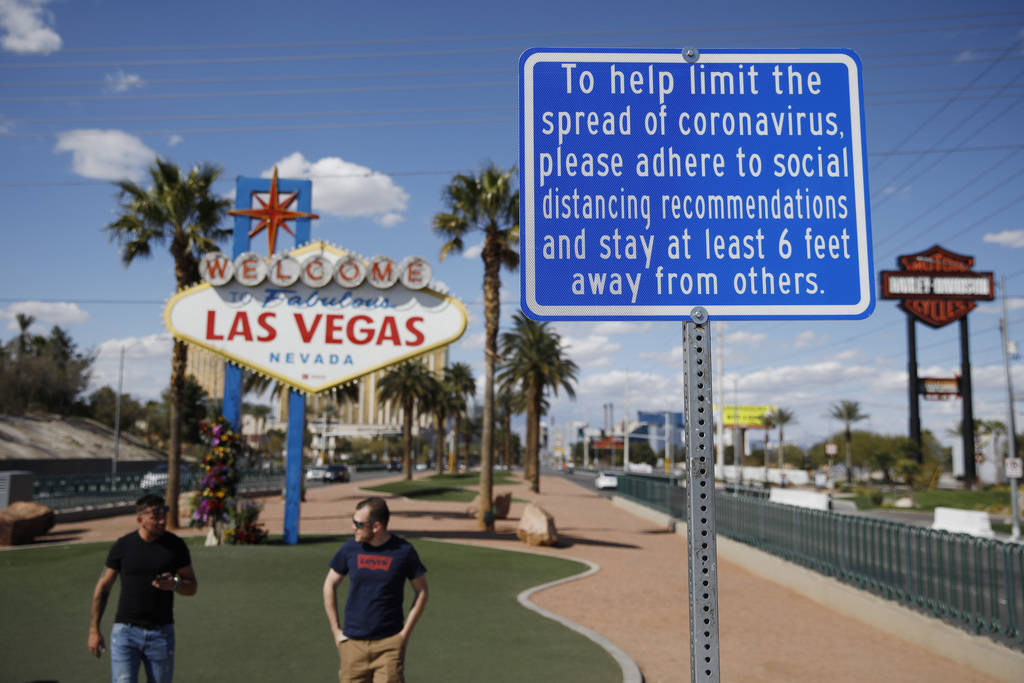With fewer offerings for fun, how will Las Vegas lure visitors amid pandemic?
A night in Las Vegas was something special.
Five-star dining experiences in front of dancing fountains. Cirque du Soleil performers flying across a stage. Some of the biggest names in entertainment headlining shows or nightclubs.
Then it all stopped.
The state is moving closer to reopening businesses, but tourism experts say things won’t be the same for quite some time. Think more masks and gloves, but no buffets or nightclubs.
Officials across the Las Vegas Valley are discussing ways to make sure travelers feel safe returning to the tourism-reliant state, but they face big challenges luring visitors to the entertainment capital of the world when its offerings are significantly reduced.
“If I can’t be free to do the things I love … that doesn’t sound like a very good time or value from my hard-earned travel dollars,” St. John’s, Newfoundland, native Karen Hanlon said.
She usually makes three trips to Las Vegas every year, but she said she won’t return until the city “returns to normal.” She doesn’t think it would be worth the expensive travel costs — or the risk to her health — if she ends up having to wear a mask, social distance and finds many entertainment options still closed.
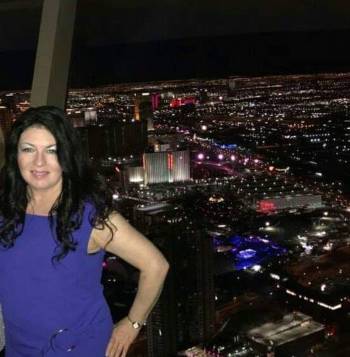
Vegas needs to show travelers that it can deliver a great pre-coronavirus experience while addressing post-coronavirus hygiene concerns, said Jonathon Day, an associate professor at the Purdue University School of Hospitality and Tourism Management.
“If it’s not a ‘safe place to play,’ it may take longer for Vegas to bounce back,” he said.
Opening differently
When the city does reopen, it will look “different than how we are used to seeing them in the past,” said Josh Swissman, founding partner of Las Vegas gaming and hospitality consulting firm The Strategy Organization.
Initial food and beverage options will probably be limited, he said. Some will have reduced operating hours, some will remain closed and others will be open only for pickup or takeaway. Buffets, another icon in Las Vegas, will probably be some of the last outlets to reopen, “if at all.”
He also expects a reduced number of pools to be opened initially, each with capacity restrictions in place.
“The goal here is to account for lower demand and to be able to better enforce new social distancing policies,” he said.
The production and staffing of shows like Cirque du Soleil performances or arena concerts “will take longer to figure out in a post-COVID-19 world,” Swissman said. Smaller shows — like comedy acts — could return sooner because they can be produced for a small, more spread-out audience.
Mud masks and Calvin Harris performances may be the last to return. Swissman said spas will need more time to develop sanitation measures, while social distancing guidelines will be difficult to enforce in nightclubs. Additionally, guidance released from the Nevada Gaming Control Board last week said nightclubs and dayclubs must remain closed until further notice.
Enola, Pennsylvania, native Tom DeMartini said he would be willing to forgo shows and lounge entertainment on his next trip to Las Vegas but didn’t want to find his favorite restaurants, spas, pool areas and nearby parks being closed. He’s pushing back a planned June stay at The Orleans to mid-September in hopes that more amenities will reopen in the fall.
“(We’re) still unsure about traveling out there — only because we don’t know what will be open/closed,” he said. “What would be the point?”
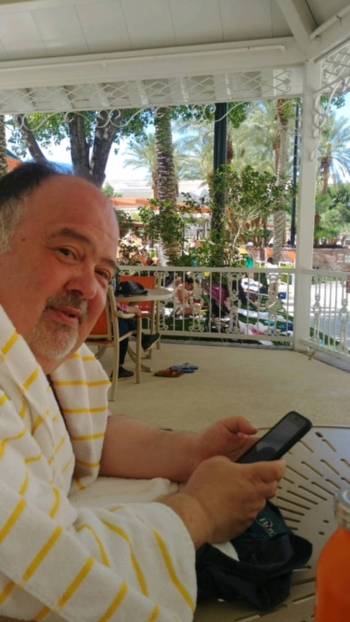
Marketing
Travelers will need to be convinced that Las Vegas is a safe destination before tourism rates can pick up, said Finley Cotrone, an assistant professor in residence at UNLV’s college of hospitality.
“We need to market, ‘Here are the things we’re doing. We’re not going have six seats a table, we’ll have three and give masks,’ ’’ she said. “Those are the things we have to make sure people know we’re doing what we can. There’s going to be a lot of marketing around the ‘new clean,’ or cleaner, Las Vegas.”
Several casino operators have started laying out plans for heightened protocols upon reopening their properties, including the use of thermal cameras, masks and social distancing.
Locals may be the first market these companies try to attract with targeted marketing, according to Billy Vassiliadis, CEO of advertising company R&R Partners.
“People in Las Vegas have been shut in for a while,” he said. “The locals could enjoy an escape.”
While R&R has helped Las Vegas recover from previous financial woes, the coronavirus pandemic is a whole new beast. People aren’t just canceling their summer trip for fiscal reasons; many are concerned that traveling could put their life at risk.
Vassiliadis said properties are now tasked with presenting a safe, protective environment.
“At the beginning, a lot of visitors will look for a safe, intimate escape experience,” he said. “We’re going to have to demonstrate everything we’re doing to assure that there’s a real commitment (to health and safety).”
A commercial from R&R’s new “What happens here, happens only here” campaign is one example of this sort of messaging.
The commercial, posted to YouTube on March 17, shows a panning shot of the Strip, with resorts lighting up the night sky.
“There’s something more important than the shows and the neon,” a narrator says in the commercial. “That something is you and your safety. That is everything. That is the only thing. … When you’re ready, we’ll be ready and better than ever.”
Vassiliadis said once Las Vegas is able to convince travelers that it’s ready, it could appeal to those who have been trapped at home for weeks, if not months.
“Their decision is between sitting at home ordering Grubhub or going to Vegas, where the weather’s going to be warm and sunny, where there are going to be food options, where it’s going to be clean,” he said.
Lisa Kozik from Colorado City, Texas, and Sussex, Wisconsin, said she realizes the Strip “will be much different than before” but believes that would be just another part of a Las Vegas adventure.
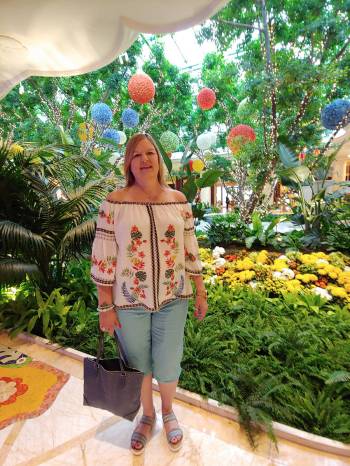
“We will definitely be there June 5 as long as the resorts are open and we can play slots, lay by the pools and eat at several of our favorite restaurants,” she said in an email. “If not, we will keep rescheduling until we can go. If we have to wear face masks to gamble, so be it! It will only make things interesting.”
But other travelers — like Rick Sewell from Kelowna, British Columbia — say they aren’t convinced heightened sanitation measures will be enough and don’t plan to return until 2021 or whenever there’s a coronavirus vaccine made widely available.
“The virus needs to be under control,” he said. “Unless this virus miraculously disappears, I can’t see how we can travel out of country, anywhere. Travel insurance doesn’t cover this virus, and I can’t afford to be hospitalized in a foreign country, especially the U.S.”
Las Vegas’ ‘new clean’
Locals and regional markets like Southern California will probably be the first to return, according to Brendan Bussmann, a partner at gaming consulting firm Global Market Advisors.
“It may take some time for the fly-in market to return at a good pace, partially because of capacity constraints and how comfortable people are ready to return to air travel.”
Predictive modeling from WPA Intelligence backs this up.
The conservative research, data science and tech firm found the week of April 6, roughly 10.1 million people in California — about 26 percent of adults — would visit Las Vegas “within a few weeks or a month,” while 11.1 million would wait and eventually visit “within a few months.” Other ready-to-travel states include Texas and Utah.
Meanwhile, a vast majority of fly-in states show fewer than 5 percent of adults would be comfortable traveling to Las Vegas in the near future.
“There’s no indication that these numbers increase without some sort of massive communication effort to explain that Las Vegas is safe and open for business again,” said Christopher Wilson, CEO of WPA Intelligence.
Vegas’ return to normalcy
No matter how prepared casinos are for the return of guests with heightened sanitization and safety guidelines, an ongoing study from the University of Florida shows that tourism’s recovery will take time.
Roughly 37 percent of those surveyed in mid-April said they don’t want to rebook canceled trips until two to six months after the virus is contained. Only 6 percent would be comfortable rebooking within a week after the virus is contained.
Lori Pennington, the director of the University of Florida’s Tourism Crisis Management Initiative, said bookings in Las Vegas will gain traction once the city can keep visitors safe.
“The risks cannot outweigh the costs,” she said. “If people think they will get sick, they will not travel. So it will be when the travel restrictions are lifted, when the destination is prepared and when the consumer feels safe.”
Swissman believes there will be “material visitation volume” in the first few weeks following the reopening because of pent-up demand from visitors, but he doesn’t think visitation numbers will be anywhere near pre-shutdown levels “for many months.”
“People are going to have to get comfortable with the idea of traveling and staying in a hotel room again,” he said.
Cotrone said she’d be surprised if Vegas’ tourism industry saw a return within the next 18 months.
“I hope to be proved wrong,” she said. “But when you look back at (the hit tourism took) in 2008, 2009, it’s a slow climb.”
Contact Bailey Schulz at bschulz@reviewjournal.com or 702-383-0233. Follow @bailey_schulz on Twitter.



